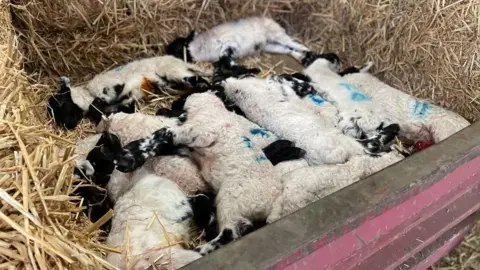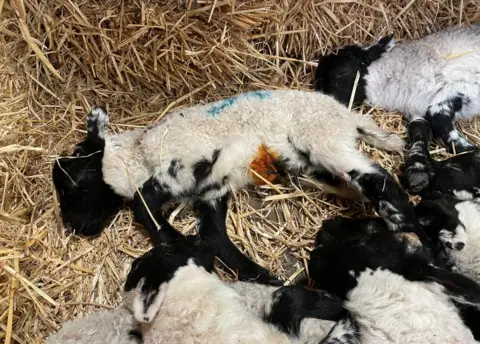Kelty farmer loses 16 lambs in 'catastrophic' dog attack
 BBC
BBCA devastated shepherd has issued an appeal to pet owners after 16 of his lambs were killed in a dog attack.
Stuart McDougall described a scene of "wanton destruction" at the farm in Kelty, Fife, where he keeps a flock of 130 pure black-faced ewes.
He said the incident was a major financial blow and had "traumatised" his children.
It comes as farmers, land managers and police promote a dog safety campaign to coincide with lambing season.
Mr McDougall said he left his flock at about 10:30 on Monday. When he returned at 13:00, six lambs were dead.
Warning: This article contains images which some readers may find upsetting
A further 10 were put down by a vet due to their injuries. Four more were less severely injured.
He described his family as "absolutely devastated".
"There had been lambs disembowelled, still alive," the farmer told BBC Scotland's Drivetime.
"Lambs with broken legs, mothers running about in distress looking for lambs that are no longer there."

Mr McDougall had come back to check on the sheep with his two young daughters, who he said were "traumatised".
Police Scotland confirmed the incident at Blairadam Farm happened at some point between 10:30 and 13:30 on Monday.
Officers believe the lambs were attacked by at least one dog.
The shepherd suspected the dog's owner had managed to capture it and had fled the field.
Police have appealed for anyone with information to get in touch.
Mr McDougall has grown his flock from a handful of sheep on rented land.
He used to supplement his income by doing fencing but has been unable to do so since damaging his spinal chord two years ago.
The estimated value of the damage is about £7,000.
"This financially has been a major, major blow for myself and my family," Mr McDougall told Drivetime after the attack.
"The monetary [impact] is one thing. But the years of dedication that I've put into my small flock ... it's catastrophic."
He added: "It's hard to put into words the emotional toll this has taken on my family, especially my two young children."

Mr McDougall said he had experience of dog attacks in the past, but not on this scale.
"I would have been forced to shoot that dog if I had seen it and had my firearm with me," he told the BBC.
"This is becoming an issue and it needs to be addressed to the general public.
"Everybody has the right to enjoy our countryside but they must remember that they have responsibilities to wildlife and livestock."
A total of 301 incidents of livestock attacks by dogs were recorded by Police Scotland in 2021, with provisional figures suggesting that number dipped to 262 in 2022.
Under the Dogs (Protection of Livestock) (Amendment) (Scotland) Act 2021, dog owners could be fined £40,000 and sent to prison for allowing their pet to attack or worry farmed animals.
Scottish Land & Estates (SLE), which represents rural businesses, is one of the partners in a campaign with Police Scotland to warn dog owners and land managers about attacks over lambing season.
'Not the dog's fault'
SLE policy advisor Simon Ovenden said dog owners and walkers should always keep them on short leads and away from fields where there are lambs, calves or other young animals.
"Dog walkers should also try to stay as far away from livestock as possible - even aggressive behaviour from a dog such as barking can cause a pregnant sheep to die or miscarry," he said.
"Such incidents are not the dog's fault, but that of the owner, and declaring that a dog has never acted in such a manner previously is of no importance when dealing with the aftermath of an attack."
Inspector Alan Dron, Police Scotland's national rural crime co-ordinator, added: "Despite numerous high-profile campaigns over many years, we are still seeing too many incidents of livestock attacks and worrying in our rural areas, often where dogs are being let off the leash or being left unattended and escaping from homes and gardens."
